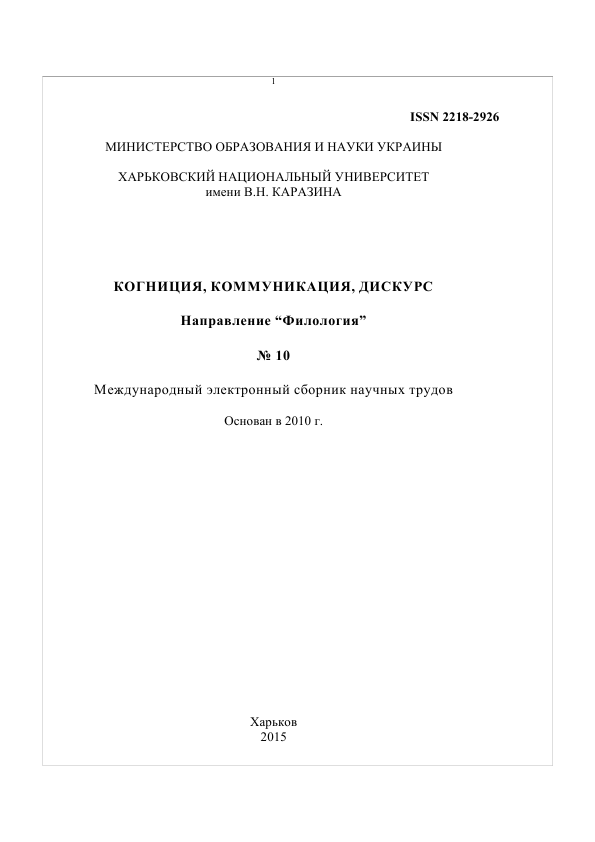One Sang the Body Electric: The Twentieth Century Russian and Bulgarian Approaches to Translating the Poetics of Whitman
Abstract
The article focuses on four translations of Walt Whitman’s poem I Sing the Body Electric into Russian and Bulgarian by Balmont, Zenkevich, Stoyanov, Svintila. The choice of the Russian and Bulgarian languages which share historical and cultural experience in their pre-communist, communist and post-communist periods enables us to define the main strategies applied to the highly unconventional poetics of Whitman by his Russian and Bulgarian translators constrained by the rules of the Socialist Realism and the literary canon of different historic periods of the twentieth century. The results obtained demonstrate an evolution of translation approaches to the structure and poetics of the original.
Downloads
References
Blok, A.A. (1962). O lirike [Upon lyrics]. In: A.A. Blok. Sobranie sochinenij v vos'mi tomah. T. 5. Moskva: Hudozhestvennaja literatura, 130-160 (in Russian)
Careva, N.A. (2007). Russkij simvolizm i postmodernizm: problemy svjazi I preemstvennosti [Russian symbolism and post-modernism: problems of connection and continuity]. Problemy filologii, kul'turologii i iskusstvovedenija, 4/2007, 157-162 (in Russian)
Emerson, R.W. (1983). Essays and Lectures: Nature; Addresses, and Lectures. Essays: First and Second Series. Representative Men. English Traits. The Conduct of Life. New York: Literary Classics.
Gutman, H. (1998). I Sing the Body Electric. Walt Whitman: An Encyclopedia. New York: Garland Publishing. Available at: http://www.whitmanarchive.org/criticism/current/encyclopedia/entry_9.html (Accessed 15 April 2015)
Kashkin, I.A. (1955). V bor’be za realisticheskij perevod [In the struggle for realistic translation]. Voprosy hudozhestvennogo perevoda. Moskva: Sovetskij pisatel’, 120-164 (in Russian)
Klatt, L.S. (2008). The Electric Whitman. The Southern Review 44.2, 321-332.
Leighton, L. (1982). Whitman in Russia: Chukovsky and Balmont. Walt Whitman Quarterly International, 22. Available at: http://www.chukfamily.ru/Humanitaria/Whitman/leighton.htm (Accessed 21 November 2012)
Litovskaja, M.A. (2008). Socialisticheskij realizm v literature XX veka [Socialist Realism in the literature of the 20 century]. Filologicheskij klass, 19, 14-21(in Russian)
Polonsky, R. (1997). Translating Whitman, mistranslating Balmont. Slavonic and Eastern-European Review, 75(3), 401-421.
Schmidgall, G. (2001). Intimate with Walt: Selections from Whitman’s conversations with Horace Traubel 1888 – 1892. Iowa City: University of Iowa Press.
Uitman, U. (1965). Strykcheta treva [Leaves of Grass]. Sofia: Narodna kultura (in Bulgarian)
Uitman, U. (1996). Trevni lista [Leaves of Grass]. Sofia: Srebyren lyv (in Bulgarian)
Uitmen, U. (1970). Izbrannye proizvedenija. List'ja travy. Proza. [Selected Works. Leaves of Grass. Prose.] Moskva: Hudozhestvennaja literatura (in Russian)
Uitmen, U. (1911). Pobegi travy [Leaves of Grass]. Moskva: Skorpion (in Russian)
Whitman, W. (2006). Leaves of Grass and Other Writings. New York: Simon & Schuster.
Authors, who publish with this journal, accept the following conditions:
The authors reserve the copyright of their work and transfer to the journal the right of the first publication of this work under the terms of the Creative Commons Attribution License (CC BY), which allows other persons to freely distribute a published work with mandatory reference to the authors of the original work and the first publication of the work in this journal.
Authors have the right to enter into separate additional agreements for the non-exclusive dissemination of the work in the form in which it was published by this journal (for example, to post the work in the electronic institutions' repository or to publish as part of a monograph), provided that the link to the first publication of the work in this journal is given.
The journal policy allows and encourages the authors to place the manuscripts on the Internet (for example, in the institutions' repositories or on personal websites), both before the presentation of this manuscript to the editorial board and during review procedure, as it contributes to the creation of productive scientific discussion and positively affects the efficiency and dynamics of citing the published work (see The Effect of Open Access).




